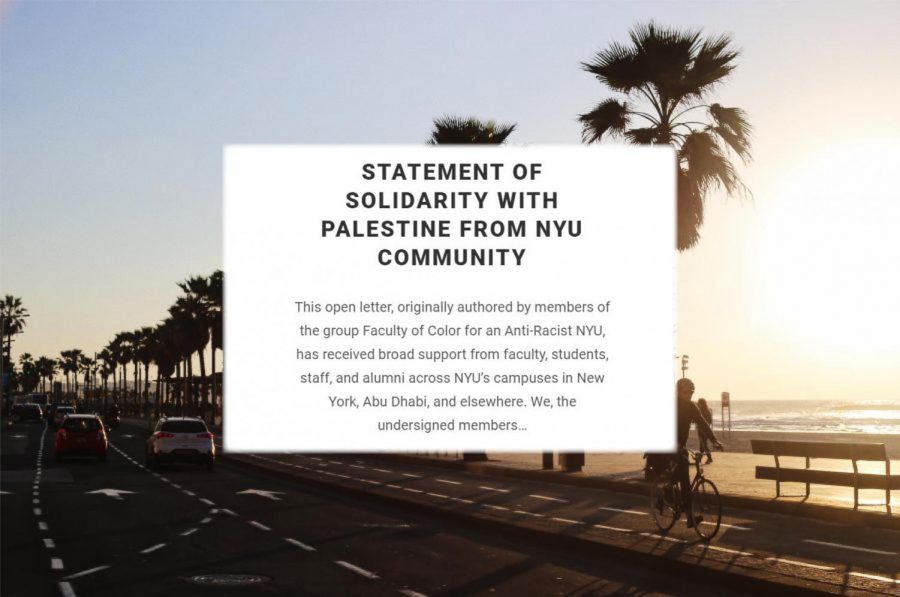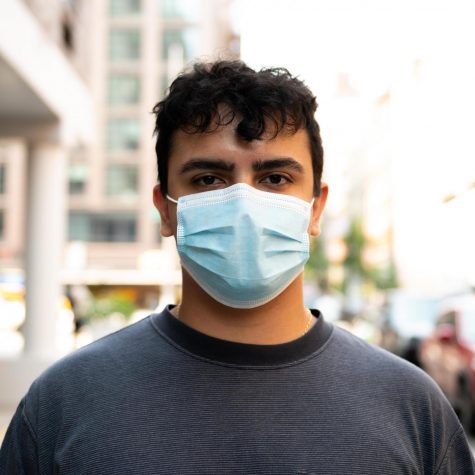NYU faculty, administration spar over non-cooperation with Tel Aviv campus
More than 400 members of the NYU community signed an open letter pledging non-cooperation with NYU Tel Aviv, drawing reproach from the university administration.
More than 400 members of the NYU community signed an open letter, titled “Statement of Solidarity with Palestine from NYU Community,” pledging non-cooperation with NYU’s study away campus in Tel Aviv. This letter has been signed by individuals and groups from across NYU’s schools and campuses. (Photo by Julia McNeill and Staff Illustration by Manasa Gudavalli)
July 1, 2021
More than 400 alumni, campus groups, faculty, staff and students signed an open letter denouncing Israeli policies, calling for free campus debate on Israel and Palestine and pledging non-cooperation with NYU’s study away campus in Tel Aviv.
The letter, titled “Statement of Solidarity with Palestine from NYU Community,” was originally published May 21. It was republished on Medium June 17 by Faculty of Color for an Anti-Racist NYU, a faculty association that has released several statements concerning race and university politics since its establishment in 2020.
The Statement of Solidarity with Palestine has been signed by individuals and groups from across NYU’s schools and campuses, according to the document, including an additional 140 students from the university’s Abu Dhabi campus who signed anonymously.
“We call on the NYU administration to ensure free and open discussion and debate about Israel, Palestine, the BDS campaign, and any other related matters,” the statement reads, referring to the boycott, divestment and sanctions movement against Israel. “Secondly, we pledge non-cooperation with the Tel Aviv program until the Israeli state ceases its military campaign and takes action to end discriminatory policies that limit Palestinian students’ access to education.”
Faculty of Color for an Anti-Racist NYU published their statement the same day the Israel Defense Forces and Hamas agreed to a ceasefire, although Israel later resumed airstrikes. The ceasefire followed 11 days of bombardment that killed 13 Israelis and more than 250 Palestinians — including 66 children — in the Gaza Strip.
“In recent weeks, Israel’s brutal military action within Israel and Palestine has escalated [the] effects of longstanding discriminatory policies,” the statement reads. “These actions have already killed hundreds, injured thousands and destroyed many civic institutions, including schools run by the U.N. agency for Palestinian refugees (UNRWA) and others.”
NYU denounced the pledge of non-cooperation in a May 25 press release for being “at odds with the tenets of academic freedom.” Echoing responses to past disputes between the university administration and campus groups, university spokesperson John Beckman said the statement unfairly targets members of the NYU community for simply being in Israel.
“The statement proposes to hold NYU Tel Aviv and its faculty responsible for national policies over which they have absolutely no control whatsoever,” Beckman said in a statement to WSN. “Isn’t a proposal to shun, reject, boycott, or otherwise discriminate against fellow members of the NYU community because of the national setting in which they work deeply at odds with NYU’s non-discrimination policies?”
WSN reached out to student groups Realize Israel and Israel Politics Society for comment. Realize Israel did not immediately respond to our request, while the Israel Politics Society declined to comment.
In the May 25 press release, Beckman emphasized the university’s opposition to the pledge of non-cooperation.
“For a host of reasons, NYU thoroughly rejects the recent petition to boycott NYU Tel Aviv,” Beckman wrote. “The focused, repeated efforts to stigmatize our program and disown colleagues in Israel troublingly ignores the historic complexities of conflict in the region … We find the effort to repudiate engagement regrettable and misguided.”
NYU’s chapter of the American Association of University Professors defended the statement of solidarity and directly responded to Beckman’s press release in an open letter to President Andrew Hamilton published May 27.
“John Beckman described these individual acts of conscience as being ‘at odds with the tenets of academic freedom,’” the NYU-AAUP’s letter reads. “In fact, the opposite is true. Faculty and staff are appealing directly to the principles of academic freedom when they adopt such positions publicly, and it is the obligation of university administrations to acknowledge and defend their speech rights without any implication of a rebuke or censure.”
Professor Helga Tawil-Souri — a Palestinian filmmaker and scholar who teaches in the departments of Media, Culture, and Communication and Middle East and Islamic Studies and a signatory of the Statement of Solidarity with Palestine — similarly criticized Beckman’s press release. The letter’s signatories were invested in expanding, rather than restricting, academic freedom, she said.
“A clearly stated demand of the statement is for ‘NYU administration to ensure free and open discussion and debate,’” Tawil-Souri noted. “The response is Beckman’s letter, which confuses the points, fails to recognize the fact that so many Palestinians and other citizens do not have access and do not enjoy academic freedom, and is itself an example of a deafness to the call for freedom and free and open discussion and debate.”
The NYU-AAUP’s letter also claimed the administration’s communications about Middle Eastern affairs have had a chilling effect on campus speech.
“Unfailingly, these statements have adopted a stance of partiality, and, on occasion, a directly punitive tone,” NYU-AAUP wrote. “Trust in the administration is undermined when it singles out, and speaks with reproach about, members of NYU’s own community in this way. At worst, this practice offers nourishment to the well-documented efforts of outside pressure groups to smear, harass, and promote the firing of employees for their views on human rights.”
The university has previously disagreed with faculty on the topic of academic freedom at its other Western Asian campus, located in Abu Dhabi, the United Arab Emirates.
Andrew Ross, a professor in the Department of Social and Cultural Analysis at the College of Arts and Science, was barred in 2015 from travelling to Abu Dhabi due to his criticism of the exploitation of migrant workers in the UAE — a system which NYU has been accused of perpetuating.
Two years later, in the fall of 2017, a majority of senior faculty at NYU’s Arthur L. Carter Journalism Institute voted to suspend cooperation with NYU Abu Dhabi after professors Mohamad Bazzi and Arang Keshavarzian were also barred from entering the UAE, which they said might have been due to their Shiite Muslim backgrounds.
In a response to the Carter Institute, Hamilton wrote that “the call to refrain from engagement is misplaced, not because the issue is not serious, but because it misses the mark, punishing students and faculty at N.Y.U. Abu Dhabi over a visa decision in which they had no hand and with which they disagree.”
Alfred Bloom, the NYUAD vice chancellor at the time, criticized the non-cooperation decision in a letter published in The New York Times.
“We find the decision of the Journalism Institute disappointing, and antithetical to a fundamental mission of education in a fractured world,” Bloom wrote.
Bazzi, in his own New York Times op-ed, wrote that “the university should admit that it has bought into a political system that actively discriminates against members of a religious minority because of an overwhelming fear of Iran and hatred of Shiites. This is far from the free movement of people and ideas to which N.Y.U.’s leaders claim to aspire.”
Bazzi, Keshavarzian and Ross all signed the Statement of Solidarity with Palestine.
Back-and-forths between the administration and various university groups have also long dogged campus discussion surrounding NYU’s Tel Aviv site as well as NYU’s relationship to Israel and its policies.
“President Hamilton’s opposition to boycotts of Israel is long-standing and well-known,” Beckman wrote in a 2018 press release regarding a Student Senators Council resolution demanding NYU divest from corporations including General Electric and Lockheed Martin due to their involvement in alleged Israeli war crimes and human rights violations.
In 2016, the Graduate Student Organizing Committee voted to approve a resolution demanding university divestment from “Israeli state institutions and international companies complicit in the ongoing violation of Palestinian human and civil rights” as well as the closure of NYU Tel Aviv.
Days later, Hamilton shut down the effort in a public statement, writing that “NYU will not be closing its academic program in Tel Aviv, and divestment from Israeli-related investments is not under consideration. And to be clear: whatever ‘pledges’ union members may or may not have taken does not free them from their responsibilities as employees of NYU, which rejects this boycott.”
Statements admonishing boycotts were also released by the administration in 2013 and 2018 in response to decisions by the American Studies Association and a coalition of over 30 student groups, respectively.
In 2019, Hamilton publicly denounced GSAS alum Steven William Thrasher for expressing support of the BDS movement during a doctoral convocation, calling his remarks indefensible, “objectionable,” “inappropriate” and “one-sided and tendentious.” NYU has since removed a web page containing a video of Thrasher’s speech.
That same year, Beckman publicly denounced the Department of Social and Cultural Analysis’ policy of non-cooperation with NYU Tel Aviv, saying that “we deplore this uncollegial and pointless effort to stigmatize the Tel Aviv program.”
Faculty who have supported these collective actions allege that, in its responses, NYU has evaded the basis for the pledges — namely, the assertion that because Israeli authorities regularly discriminate at border crossings and bar access to the country based on perceived Arab ethnicity, Palestinian national origin and political opinion, the operation of the Tel Aviv site is in violation of NYU’s non-discrimination policies.
Since a 2017 amendment to the Entry Into Israel Law of 2003 — a policy that NYU voiced opposition against — supporters of any form of boycott of Israel or individuals who work under an organization that advocates those measures are barred from entering the country.
Canary Mission, an anonymous pro-Israel website compiling dossiers on Palestinian rights advocates, has been used alongside web and social media searches to bar students and professors from entering Israel as a result of their political opinions or activities, according to a 2018 investigation by the Israeli daily Haaretz. Multiple NYU campus groups, students, and faculty are on the blacklist, including members of Students for Justice in Palestine, Jewish Voice for Peace and professor Andrew Ross.
“Access needs to be thought about holistically, as a structural issue, and not simply whether one person or another can individually go,” Tawil-Souri said regarding the statement authored by Faculty of Color for an Anti-Racist NYU. “Those whose academic freedom are suppressed and those who are being ostracized here are Palestinians and their supporters. The statement is calling for a recognition of and an end to those policies.”
Contact Suhail Gharaibeh at [email protected]


























































































































































W • Jul 20, 2021 at 6:49 pm
We all know what this is really about, the same thing the Ben and Jerry’s decision today was about. There’s a clear double standard on Israel
Martin Mellish • Jul 20, 2021 at 3:57 am
Prof. Straussner: ‘Multiple NYU campus groups, students, and faculty are on the blacklist, including members of Students for Justice in Palestine, Jewish Voice for Peace and professor Andrew Ross.’
S L Straussner • Jul 12, 2021 at 2:33 pm
For the past 6 years I have taken NYU graduate students for an intensive course at
the NYU Tel Aviv campus. These students came from Muslim, Christian and Jewish backgrounds. .None have ever not been allowed into Israel. The same has been true of students taking other courses with other professors from other schools at NYU. Does anyone know of ANY NYU student that was not allowed to take a course? I would be happy to talk with them. As a reporter wouldn’t you want to do the same?
Prof Straussner
Raymond E. Turner • Jul 11, 2021 at 6:06 pm
hello
alyce leibowitz • Jul 3, 2021 at 5:23 pm
What is next? Is NYU/Hospital connected to this? Do not agree and think Jewish students and alum should react.